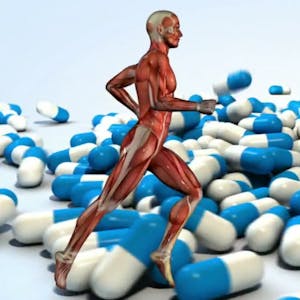Explore the multifaceted world of doping in sports with the course "Dopage: Sports, Organisations et Sciences" offered by the University of Lausanne. Delve into the historical, social, and legal construction of doping norms, and gain insights into the cultural significance of performance enhancement. The course provides a comprehensive understanding of the complex interplay between biological, psychological, and sociological factors influencing doping practices. Additionally, it offers an in-depth analysis of the institutions, actors, and strategies involved in combating doping, shedding light on the roles of sports authorities, state bodies, and anti-doping organizations in prevention and control measures.
Throughout the course, participants will explore the emergence and evolution of doping norms, the motivations driving athletes to engage in doping practices, and the psychological and social dimensions shaping these behaviors. Furthermore, the course delves into the pivotal role of organizations such as the World Anti-Doping Agency (WADA), the Union of European Football Associations (UEFA), and the Court of Arbitration for Sport (CAS) in addressing doping issues within the realm of sports.
Moreover, participants will gain insights into the bioanalytical and forensic approaches employed in the detection of doping, exploring the functioning of accredited laboratories, the implementation of the biological passport, and the intricacies of anti-doping control procedures. By the end of the course, individuals will be equipped to comprehend the cultural, social, and organizational dimensions of doping, critically analyze the multifaceted nature of the phenomenon, and recognize the influence of contextual factors on individual decisions pertaining to doping.
Certificate Available ✔
Get Started / More Info
Embark on a comprehensive exploration of doping with four modules. Understand the history, motivations, organizational responses, and detection methods.
Module 1 - Identification et définition du dopage: Gain insights into the historical evolution of doping norms, the social construction of definitions, and the establishment of legal standards. Explore the complexities of defining and identifying doping, and recognize the cultural significance of doping practices.
Module 2 - Pourquoi les sportifs se dopent-ils ?: Delve into the motivations driving athletes to engage in doping, examining the psychological, social, and career-related factors influencing doping behaviors. Gain a comprehensive understanding of the complex interplay of motivations, risks, and socialization in relation to doping practices.
Module 3 - Les organisations face au dopage: Explore the roles and policies of key organizations such as the World Anti-Doping Agency (WADA), the Union of European Football Associations (UEFA), and the Court of Arbitration for Sport (CAS) in addressing doping issues. Gain insights into the strategies and measures employed by these organizations to prevent and combat doping.
Module 4 - Les approches bioanalytiques et forensiques du dopage: Gain an in-depth understanding of the bioanalytical and forensic approaches utilized in the detection of doping. Explore the functioning of accredited laboratories, the implementation of the biological passport, and the complexities of anti-doping control procedures.
This course offers an in-depth exploration of Self-Determination Theory (SDT) and its applications in various social contexts, equipping students with the knowledge...
Psicología de la Percepción delves into the workings of our senses, exploring the distinction between sensation and perception, the role of memory and attention,...
Schizophrenia course offers an introductory exposure to the nature of the psychiatric disorder, covering biological and psychological factors, neuroscience, diagnosis,...
This course explores the fundamental processes of social groups within organizations, addressing concepts such as group dynamics, social facilitation, leadership,...